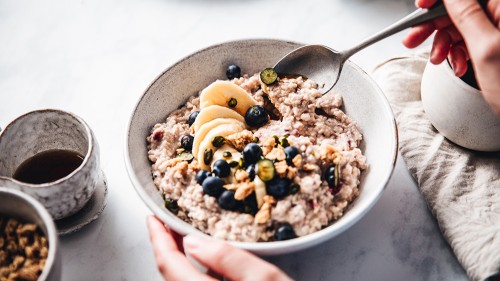WellnessVerge is reader-supported. We may earn a commission when you make a purchase through the links on this page. Learn more about our process here.
Iaso Tea Review: Overpriced Detox or Real Results?
Last Updated on October 1, 2025
Medically Reviewed by Anthony Dugarte, MD
Iaso Tea, sold in Original and Instant versions, is promoted by Total Life Changes (TLC) as a detox and weight loss solution. It claims to cleanse, support digestion, and aid weight loss, but a closer look at its ingredients, lack of transparency, and legal history shows it may not live up to the hype.


Key Takeaways
- Iaso Tea’s strongest ingredient is senna, which works as a stimulant laxative rather than a true detox aid.
- The label doesn’t reveal exact ingredient amounts, so you don’t really know how much of anything you’re drinking.
- The company behind Iaso Tea has a history of lawsuits and regulatory warnings.
- At about $12 per bag, it’s priced far higher than comparable herbal teas with more transparent labeling.
|
Pros
|
Cons
|
What Is Iaso Tea?
Iaso Tea is an herbal blend sold in both Original (tea bags) and Instant (powdered sachets) versions. It is produced and marketed by Total Life Changes, LLC (TLC), a U.S.-based wellness company.
The company promotes the tea as aiding weight management, supporting gut health, and providing a gentle cleanse — claims that are common in the detox tea market.
TLC once relied heavily on multi-level marketing (MLM), but its products are now widely available to consumers through the company’s website and major online retailers.
A key concern with Iaso Tea is its lack of transparency. The tea’s ingredients are listed as part of a proprietary blend without individual amounts, making it difficult to know whether it can realistically deliver the advertised benefits.
In this review, we’ll examine what Iaso Tea contains, how it works, and what the scientific evidence suggests about its claims. We’ll also cover side effects, the company’s legal history, cost, and whether it’s worth buying.
Iaso Tea Ingredient Review
TLC provides only the total blend weight for Iaso Tea, not the amount of each herb. Without that detail, it’s unclear whether the ingredients are present in doses that could make a difference.
Iaso Tea Original
The Original tea contains a nine-ingredient herbal blend (3,600 mg per serving). Several of these are traditional digestive aids, but the inclusion of senna means this formula also serves as a stimulant laxative.
- Senna (Cassia angustifolia) extract— A powerful herbal laxative. It can be effective for occasional constipation but may also cause cramping and diarrhea in some users. (1)
- Myrrh (Commiphora myrrha) — A resin traditionally used for infections and inflammation. In this tea, it likely acts as a mild laxative. (2)
- Blessed Thistle (Cnicus benedictus) — Used historically for indigestion and inflammation. It also has diuretic effects, which may increase urination. (3)
- Papaya Leaf (Carica papaya) — Contains papain, an enzyme that aids digestion and has a mild laxative effect. Some research suggests that papaya leaf may help regulate blood sugar levels. (4, 5)
- Persimmon Leaf (Diospyros kaki) — Used in traditional medicine for inflammation, blood sugar support, and antibacterial effects. It also has diuretic properties. (6)
- Chamomile (Matricaria chamomilla) extract — Rich in flavonoids, especially apigenin, which can promote relaxation and sleep. It also has anti-inflammatory and possible blood sugar benefits, and may help soothe digestion. (7, 8)
- Marshmallow Leaf (Althaea officinalis) — A mucilaginous herb that coats and soothes the digestive tract, often used for stomach irritation. (9)
- Malva Leaves (Malva verticillata) — Used as a soothing demulcent herb to calm stomach irritation and promote bowel regularity. (10)
- Ginger (Zingiber officinale) — Widely used for indigestion and nausea relief, with additional laxative and diuretic effects. (11)
Summary: The Original formula combines herbs that may support digestion and bowel regularity, with additional soothing and anti-inflammatory properties. Senna is the most active ingredient, driving its laxative effect.
Iaso Tea Instant (Powdered Sachets)
The Instant tea contains a smaller, four-ingredient blend (3,500 mg per serving). Three overlap with the Original formula, and one — maize dextrin — is unique to this version.
- Maize Dextrin — A soluble fiber derived from corn. It can aid digestion and add bulk to stool. (12, 13)
- Senna Leaf Extract (Cassia angustifolia) — A stimulant laxative commonly used for constipation relief.
- Papaya Fruit Extract (Carica papaya) — Provides digestive enzymes that may support protein breakdown and modestly affect blood sugar.
- Chamomile Herb Extract (Matricaria recutita) — Offers calming, anti-inflammatory, and digestive-soothing effects.
Summary: The Instant version is a simplified formula that contains senna, papaya, chamomile, and maize dextrin. Senna provides the strongest and most consistent effect, while the other ingredients contribute milder digestive or calming support.
Do the Claims Hold Up?
TLC claims Iaso Tea can support digestion, circulation, intestinal health, and weight management. Here’s what the evidence suggests:
- Digestive wellness: Supported, mainly due to senna, papaya, and ginger
- Circulatory support: Weak evidence, tied indirectly to anti-inflammatory herbs like chamomile
- Healthy intestines: Strongest support, since several ingredients improve bowel regularity
- Weight management: Very limited evidence; no strong research supports lasting weight loss
In practice, the primary effect of Iaso Tea is likely to be more frequent trips to the bathroom—not meaningful detoxification or sustainable weight loss.
Side Effects and Safety
Both the Original and Instant versions of Iaso Tea contain senna, a stimulant laxative. While effective for occasional constipation, senna can also cause diarrhea, abdominal cramping, dehydration, and, with long-term use, possible electrolyte imbalances or laxative dependency.
Other safety considerations include:
- Maize dextrin (Instant only) is a soluble fiber that is generally safe, though some people may experience bloating or gas.
- Myrrh and blessed thistle have historical associations with stimulating uterine contractions and should be avoided during pregnancy.
- Papaya leaf, chamomile, malva, and marshmallow are generally safe in tea form, but may cause allergic reactions in sensitive individuals.
Since only the total blend weight is disclosed, the actual potency of the ingredients and the safety margins cannot be reliably determined.
Summary: For most healthy adults, occasional use of Iaso Tea is unlikely to be dangerous. However, the presence of senna in both formulas means side effects are possible, and long-term daily use raises safety concerns. Pregnant or breastfeeding women, and people with chronic digestive or medical conditions, should avoid it.
Legal Troubles
TLC has faced serious challenges that raise concerns about safety and transparency:
- THC lawsuit: A U.S. service member sued TLC after testing positive for THC, alleging Iaso Instant contained THC despite being marketed as THC-free. Independent testing confirmed the presence of THC, and the case remained pending.
- FTC warning: The Federal Trade Commission sent a warning letter over false claims that Iaso Tea could reduce COVID-19 risk and misleading promises tied to the company’s distributor earnings. TLC was required to remove those claims.
Together, these incidents raise questions about the company’s reliability and product integrity.
Cost
Iaso Tea is far more expensive than similar products.
- Original Tea: $59.95 for 5 bags (almost $12 per bag) or $119.95 for 10 bags ($12 per bag, no discount)
- Instant Tea: $64.95 for 50 sachets or $39.95 for 25 sachets
By comparison, many detox teas on Amazon cost $5–$15 for 15–25 bags. Other laxative or digestive teas with similar ingredients can be purchased for a fraction of the price, often with more transparent labeling.
How Iaso Tea Compares to Alternatives
There are dozens of detox teas on the market, most of which are made with blends of herbs that act as mild laxatives. Like Iaso, they may help with regularity but don’t offer meaningful “detox” benefits.
The key difference is price and transparency. While Iaso sells for nearly $10 per bag, many other teas list their ingredients and dosages clearly and cost a fraction of that. For example, Traditional Medicinals Smooth Move Tea combines senna with other herbs that may ease constipation, is fully labeled, and sells for about $28.72 for 96 bags (roughly $0.30 per bag).
Overall, Iaso offers nothing unique compared to cheaper, more transparent alternatives.
The Bottom Line
Iaso Tea is marketed as a detox solution, but in reality, it’s an expensive version of herbal tea with added laxatives. The lack of transparency around ingredient amounts raises too many questions about effectiveness and safety.
At nearly $12 per tea bag, the price alone is a red flag when compared to other clearly labeled herbal teas that cost a fraction of the price.
While some ingredients may support digestion or reduce inflammation, the benefits are likely mild at best—and certainly don’t justify the cost or the company’s exaggerated claims. More troubling is that one product was found to contain THC when marketed as THC-free, suggesting the possibility of other unwanted ingredients.
Taken together, the high price, weak evidence, and serious trust issues mean this is not a product I would recommend.
Additional Tips for Detoxing
If your goal is better digestion or “detox,” no tea will provide a shortcut. Your body already has effective detox systems—your liver, kidneys, and digestive tract—that work best when you care for them consistently.
Practical ways to support your body naturally include:
- Staying hydrated throughout the day
- Eating more fiber-rich fruits, vegetables, and whole grains
- Limiting alcohol, added sugars, and highly processed foods
- Exercising regularly and getting adequate sleep
- Managing stress, which also impacts digestion and overall health
These lifestyle habits have a greater impact on your health than any detox tea can.
At WellnessVerge, we only use reputable sources, including peer-reviewed medical journals and well-respected academic institutions.
- Efficacy and Safety of Over-the-Counter Therapies for Chronic Constipation: An Updated Systematic Review - PMC:
https://pmc.ncbi.nlm.nih.gov/articles/PMC8191753/ - Components, therapeutic value and uses of myrrh:
https://pubmed.ncbi.nlm.nih.gov/12685809/ - An Evidence-Based Systematic Review of Blessed Thistle (Cnicus benedictus) by the Natural Standard Research Collaboration:
https://www.researchgate.net/profile/Wendy_Weissner/publication/247896516_An_Evidence-Based_Systematic_Review_of_Blessed_Thistle_Cnicus_benedictus_by_the_Natural_Standard_Research_Collaboration/links/00b7d533252fcb0128000000/An-Evidence-Based-Systematic-Review-of-Blessed-Thistle-Cnicus-benedictus-by-the-Natural-Standard-Research-Collaboration.pdf - Papaya preparation (Caricol®) in digestive disorders:
https://pubmed.ncbi.nlm.nih.gov/23524622/ - Hypoglycemic effect of Carica papaya leaves in streptozotocin-induced diabetic rats:
https://pubmed.ncbi.nlm.nih.gov/23190471/ - Persimmon (Diospyros kaki L.) leaves: A review on traditional uses, phytochemistry and pharmacological properties:
https://www.sciencedirect.com/science/article/abs/pii/S037887411500015X - Chamomile: A herbal medicine of the past with bright future:
https://www.ncbi.nlm.nih.gov/pmc/articles/PMC2995283/ - A Review of the bioactivity and potential health benefits of chamomile tea (Matricaria recutita L.):
https://onlinelibrary.wiley.com/doi/abs/10.1002/ptr.1900 - Gastro-Protective and Anti-Oxidant Potential of Althaea officinalis and Solanum nigrum on Pyloric Ligation/Indomethacin-Induced Ulceration in Rats - PMC:
https://pmc.ncbi.nlm.nih.gov/articles/PMC6912529/ - Ethnobotanical and scientific aspects of Malva sylvestris L.: a millennial herbal medicine:
https://onlinelibrary.wiley.com/doi/full/10.1111/j.2042-7158.2011.01383.x - Ginger: An Overview:
https://www.aafp.org/afp/2007/0601/p1689.html - Polydextrose and soluble corn fiber increase five-day fecal wet weight in healthy men and women - PubMed:
https://pubmed.ncbi.nlm.nih.gov/23427334/ - Digestion-resistant maltodextrin effects on colonic transit time and stool weight: a randomized controlled clinical study | European Journal of Nutrition:
https://link.springer.com/article/10.1007/s00394-015-1045-4





